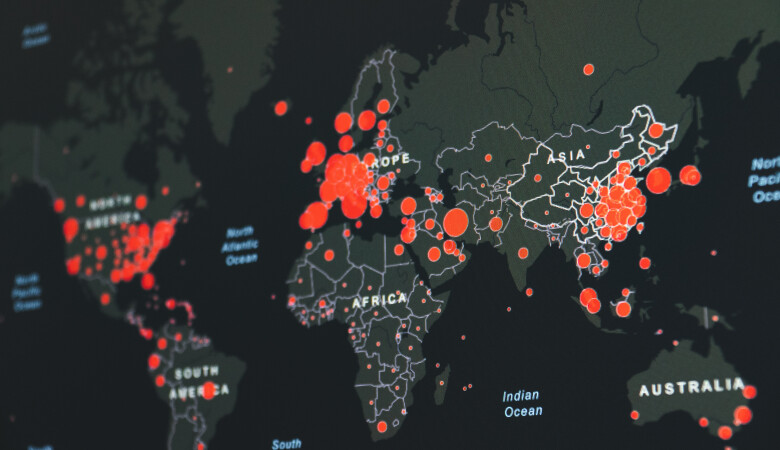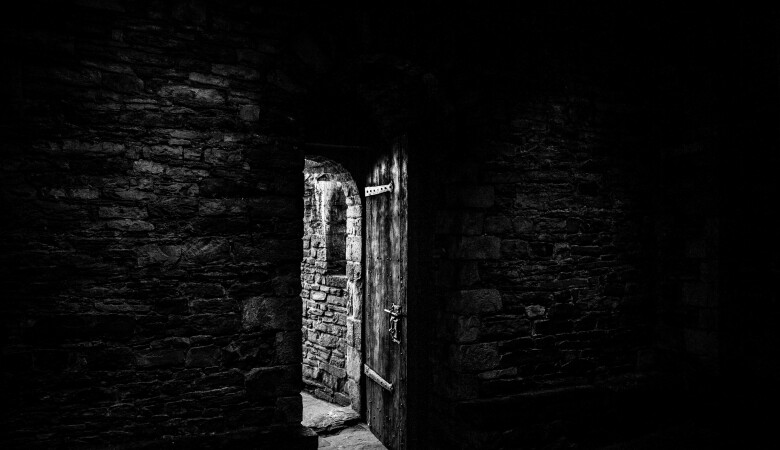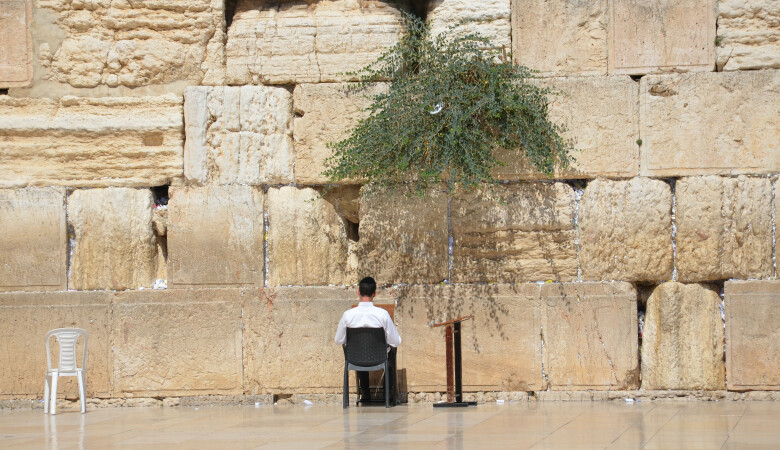Series: Mark
Radical Warfare Against Sin (Mark Sermon 46)
March 19, 2023 | Andy Davis
Mark 9:42-50
Christian Freedom, War Against the Flesh, Abiding in Christ
Christ is fiercely protective of all of his children from any that would harm them in any way.
- SERMON TRANSCRIPT -
Turn in your Bible to Mark chapter 9. We continue in our study of this glorious gospel, Mark 9: 42-50. In this sober passage, Jesus calls on His people to a radical warfare against sin. He uses extreme language. He warns the worlds not to lure His little ones into sin, and He warns His own people to fight their own sin in the most extreme way, even to the point of cutting off a hand or a foot, or a plucking out of an eye if any of them should cause you to sin. And why? Because Jesus tells of the infinite danger of hell, a place of eternal torment, where the worm does not die and the fire's never quenched. So the question comes up in my mind now, what role should the fear of hell fire play in a person's salvation?
In past centuries, it was a dominant theme. People understood and feared hell, and they sought to be delivered from hell. Martin Luther was terrified of hell growing up. When caught in an electrical storm in the middle of a field in Germany, he fell down into the mud, and cried aloud for deliverance from that immediate danger, lest he should be thrown into hell, having been struck by lightning, a far greater torment awaited. He made a pledge to become a monk, so that he should escape the terrors of hell. John Bunyan, in his allegory, Pilgrim's Progress, an allegory of the Christian life on its journey, he focuses on an individual who he'd come to know as Christian in the allegory. He begins his story in a place called the City of Destruction. He finds out, by reading a book in his hand, that the city is liable for the wrath of God, and he wants to flee the wrath of God, but he doesn't know where to go. He doesn't know where he can run to flee the wrath of God. So this begins his pilgrimage.
Clearly, Bunyan thought the fear of hell was a reasonable motive for beginning the Christian journey. Jonathan Edwards, during a time of awakening, went to Enfield, Connecticut, a place that had missed out on the revival for various reasons. He went there and preached the most famous sermon in American church history, “Sinners in the Hands of an Angry God”, in which he makes it very plain, the terrors of hell, and the justice of God in sending the damned to hell. The people were savingly worked upon by this fear. It was, for them, a reason to flee to Christ. But nowadays, I think very few people hear a hellfire and brimstone sermon. It's just a very rare thing in our parts these days. It's mocked, it's derided, it's spoken of in culture. I think it's Satan's work to warn preachers like me off from preaching a text like this as it's written. But I believe if Jesus were here today, He would not shrink back from warning each of you of the terrors of hell. He would not shrink back from describing it to you. In fact, I think He's doing that in the text today, in the timeless Word of God.
I believe that this motive of fear, of deep fear, is in line with what God worked at Mount Sinai with His people. As you remember, in Exodus 19 and 20, as He gets the people ready to receive the law of God, the 10 Commandments,[Exodus 19: 16 -19], the scene is set and described for us. There is thunder and lightning and a thick cloud on the top of the mountain, a very loud trumpet blast, and everyone in the camp trembled. Moses led the people out of the camp to meet with God at the foot of the mountain. Mount Sinai was covered with smoke, because the Lord had descended on it, and fire and smoke billowed up from it, like smoke from a furnace. The whole mountain trembled violently, and the trumpets sounded louder and louder. Then, Moses spoke to God, and God spoke to the people. He proclaimed in their hearing, in a voice that was so loud and so terrifying that they begged after they heard it, to never hear that voice again unless they should die. God proclaimed the 10 Commandments, beginning with this, “I am the Lord your God who brought you out of Egypt, out of the land of slavery. You shall have no other gods before me.” Then the rest of the nine commandments that followed. Interestingly, He says in Exodus 20:20, these words, "Do not fear. God has come to test you, so that the fear of God will be with you, to keep you from sinning.”
In some sense, you could say that's the most illogical paragraph you'd ever find, “Do not fear”. It's like God, it seems like the only thing you're going after here, today is fear. But even within the statement, “Do not fear, God has come to test you so that the fear of God will keep you from sinning.” In effect, He's saying, "Fearing me and fearing sin, you need fear nothing else. But if you don't fear me and you don't fear sin, you need to fear everything." Or how much more I think, Jesus' words. I think that's what He's working here, the same kind of thing. As John Newton put it was, "Twas grace that taught my heart to fear, in grace my fear is relieved." I think we skip that first step. What fear could there be? Oh, there's a very real fear. There should be a very real fear, a fear of hell. Fear of eternal conscious torment is God's just punishment for our breaking His laws. But if you fear God properly, you'll flee to Christ the Savior from the penalty of sin, which is hell. You'll flee to Christ, and you'll find deliverance from that penalty. And then fearing sin properly, you'll again, flee to Christ, who is the deliverer from the presence and practice of sin as well. That's what I think Jesus is working in us today.
This passage calls us to a radical warfare against temptation and against sin. What do I mean by radical? The word radical comes from the Latin word “radix”, which means “root”, like the root of a plant. There are two senses of the word radical in the way we use the word now. The first is, radical means having to do with basic foundational principles, going to the purest essence of the thing, what is elementary and intrinsic to the thing itself. The purest essence of the thing is what's radical, meaning, the original root nature. And here, it's discipleship, radical discipleship. What goes to the root of it? It should be a hatred of sin and a warring against it. It's a radical warfare to the essence of discipleship.
Radical secondly though, means sometimes, extreme, or intense, or fanatical, or revolutionary. So I want to just combine them, and let's take them as both radical, something both fundamental and fanatical. Something that is both intrinsic, but also intense. Something that is elemental, but also extreme. Jesus is taking the basic, the purest basic aspects of discipleship and extending them to their logical conclusions when it comes to sin. And what is discipleship? Go back to Mark 8: 34-37, Jesus said, "If anyone would come after me, he must deny himself and take up his cross and follow me. For whoever wants to save his life will lose it. But whoever loses his life for me and for the gospel will save it. What good would it be for a man if he should gain the whole world and forfeit his soul?" Or, what would a man give in exchange for his soul? Why would you forfeit your soul? What's the threat against your soul? It is sin, and the temptation that leads to sin. That's the threat. The temptations, Peter tells us, wage war against your soul [1 Peter 2:11]. Dear friends, I urge you, as aliens and strangers, to abstain from the passions of the flesh which wage war against your soul. This text, as we're going to walk through it, is a radical call to warfare against sin, and there are other themes as well as we'll walk through them.
"What's the threat against your soul? It is sin, and the temptation that leads to sin."
Now, before I do, I want to say a word about the manuscripts. I hardly ever mention the manuscripts, but some of you may have been sharp-eyed to notice that a couple of verses didn't get read. Or maybe you didn't notice. So go ahead and look on the page of your paper Bibles. I don't know what your electronic Bibles do. But you'll notice perhaps, that verse 44 and verse 46 just aren't even there. Wait a minute, I thought Jesus said, "Heaven and earth will pass away, but my words will never pass away." How do these float away? It's because we don't have the original Gospel of Mark. What we have are copies that were made in subsequent centuries. So, we come along later, archeologists find those old manuscripts, and they present them to the libraries of the world. Then, scientists, technologists, come along and study the various manuscripts, and put together what they think is the best guess, or the best scholarly approximation of the original Gospel of Mark. These manuscripts, the oldest and best manuscripts, don't have verse 44 and 46. All they are, the footnote will tell you what it is, it says again and then again and again, where the worm does not die and the fire is not quenched. That's all it says. That's what's dropped out. So the meaning of the passage doesn't change.
What happened was, I think some of the monks, they meant well, but they want to help us out. They kind of doubled down on that, “the worm does not die and the fire's not quenched” statement. They doubled down again, and they added it, but it isn't there originally. So I just wanted to say that about manuscripts. Praise God, there's no significant Christian doctrine, or even insignificant doctrine, hanging in the balance on manuscript studies. But we're grateful for brothers and sisters that do a good job at presenting to us the best manuscripts, and then coordinating so we can understand the original text. So that explains that. If anybody want to come and say what you think went on with verse 44 and 46 and you have your theory, I'd like to listen.
I. Jesus Warns About Temptation
Let's dig in now and walk through it, as Jesus warns about temptation. Look at verse 42, "If anyone causes one of these little ones who believe in me to sin, it would be better for him to be thrown into the sea with a large millstone tied around his neck." At this point, Jesus is looking beyond His people to the world, and He's speaking to the world. There's a warning for us too as we read it. It's a universal warning to anyone would tempt His children. It is in the spirit of God's fierce protection of His people. When He said in the Old Testament, "If anyone touches my people, it's like they're touching the apple of my eye." Like you're poking your finger in God's eye if you do anything to His people, He wants to protect them. It's fierce in His protection. Jesus is like an eagle fiercely protecting his nest and his young.
What does He have in mind? The immediate conversation here, as you remember from last week, is the disciples are arguing about which of them was the greatest. That the statement was inevitably going to lead them into sin, and it was going to lead them into pride, and jealousy, and negative feelings about each other. He's warning them not to tempt each other, but the real enemy here is outside the gates, outside the camp, it's the world. We know that from the parallel passage of Matthew 18: 6-7. There, Jesus said, "If anyone causes one of these little ones who believe in me to sin, it would be better for him to have a large millstone hung around his neck and be drowned in the depths of the sea. Woe to the worlds because of the things that cause people to sin. Such things must come but woe to the man through whom they come."
He is warning the world about the way that they bring assaults and temptations on His own people. The world there, is the alluring system of enticements and assaults on our soul, a system of temptations. Temptations to sexual sin by internet images and porn sites, and elicit services, designed to connect people with sex workers. Woe to the world because of that. Temptations to greed and materialism by constant ads and appeals to our base nature of restless discontentment. Yearning to satisfy by owning something else, something we don't possess yet, so that we're greedy for more. Woe to the world because of that.
Temptations to power, temptations to rage, temptations to blasphemy, worldly entertainment. All of these alluring things in the world system, what 1 John 2:15 calls the world is “the lust of the eyes, the lust of the flesh, the boastful pride of life.” Woe to the world because of those things. Woe is a judgment, a prophetic judgment is coming on the world because of these evil things. We believe Satan is behind that worldly system of allure, allurements and enticements. He's in a very dark intelligent way, managing the world to lure people into sin.
Here, or in Matthew 18:7, especially, Jesus is focusing on the human agents of temptation. They're human beings behind it. There is a person or a group of people, a team of engineers behind these websites and these electronic enticements. Someone is out there writing algorithms to ensnare you, and feed you what you already want to hear, to stoke your ego. They're going to try to monetize it, but they also want to allure you into what they're doing, so that you use their thing. Someone is plotting, and planning, and executing a system of temptations. It's not accidental. Men and women are using their marketing skills, and their psychological knowledge, and their programming acumen, and their scientific knowledge, to entrap other people and make them do what they want them to do. Woe to the world because of that.
I was watching some time ago, a documentary about the tobacco industry, and their lies about the addictive nature of their products a number of decades ago, and how their chemists actually studied how to make the tobacco products more addictive. How they could deliver the addictive chemicals to the human body more effectively and make it more addictive. I think actually, programmers of video games, and others trying to do that, they want, they actually advertise that they're addictive. It means that it's a really good game, it's addictive. They want their things to go viral, meaning that, more and more people will be addicted to the things that they are crafting. These are the human agents of temptation.
Not to mention those things that are openly spoken of as addictive, such as the opioid chemicals that are pouring across our borders, like fentanyl, and they're ravaging communities and killing thousands of people. Some chemists worked on those recipes. They used their intelligence to come up with them, they didn't just fall out of the poppy plant. Then, drug cartels are using their knowledge and skills and intelligence to deliver them so that people are increasingly addicted, and they don't care if they die.
The drug epidemic, I think, is just a picture of sin in general. Sin is addictive and it leads to death. It's literal, but it's also a bit of a metaphor, a parable for what we're talking about here with sin. Jesus says, concerning those human agents, "It would be better for them to have a large millstone tied around their neck, and be thrown in the depths of the sea." It's a heavy millstone, like the kind used by a donkey, not a little hand mill that a woman would use in the kitchen, but we're talking one of those big ones, tons of weight put around these tempters to be drowned in the depths of the sea. Drowning is a terrible death, one of the worst ways to die. The millstone would weigh several tons, they were tied around your neck, and you're thrown in the deepest part of the ocean. You'll be dragged down, ever down, always down, and your lungs bursting, just yearning for oxygen, until at last, you expire, very painfully.
Jesus is using extreme language here, warning the world concerning temptations, but He also wants His children to deal with their own temptations, to deal with their own sins. Look at verses 43-47, "If your hand caused you to sin, cut it off. It is better for you to enter life maimed than with two hands to go into hell where the fire never goes out. And if your foot cause you to sin, cut it off. It is better for you to enter life crippled than to have two feet and to be thrown into hell. And if your eye cause you to sin, pluck it out. It is better for you to enter the kingdom of God with one eye than to have two eyes and to be thrown into hell." He's calling on a radical warfare against our own lusts. Jesus is using hyperbole; "If even your own hand causes you to stumble." It's a stumbling stone in the Greek, or the KJV says, "offends you." Spurgeon, when preaching on this said, "If something offends God, it should offend you."
It should be obvious, I would hope it's obvious to us, that He's not speaking literally here, in terms of cutting off your actual physical hand, or cutting off your actual physical foot, or plucking out your actual physical eye. Sometime ago in Mark 7, Jesus made it plain. In Mark 7:18, "Nothing that enters a man from the outside can make him unclean." And then in that same passage, Mark 7, 23:23, He said, "What comes out of a man is what makes him unclean, for from within out of men's hearts come evil thoughts, sexual immorality, theft, murder, adultery, greed, malice, deceit, lewdness, envy, slander, arrogance, and folly." All these evils come from inside and these are what make a man unclean. So your hand cannot make you sin, neither can your foot or your eye. Sadly, in church history, there were some individuals that took statements like this and some others, literally, especially in terms of sexual immorality, and maimed themselves, made themselves eunuchs for the kingdom of God. Others were ascetic monks who took on a very harsh lifestyle, harsh against the physical body, believing that that would guarantee holiness. But the consistent testimony of these very individuals when they're honest, was that they still dealt with lust every bit as much as ever before.
Sin resides in the heart, and expresses itself in the life, in the lifestyle. It starts in the heart and expresses itself as in terms of how we live. I think these three parts of the body represent that. The hand represents what you do. The eye represents what you look at. The foot represents where you go, or even how you live. So whatever you touch, whatever you look at, wherever you go, be radically committed to holiness. That's what he's saying here. You need to study your lifestyle. You need to look at how it's actually going for you, what's actually happening in your life. Whenever you do fall into temptation and sin, whenever you violate your conscience, you need to trace it back to the root, and find out what Satan did, and what the world did to allure. How did the world and the devil conspire with your inner lusts to produce that outcome? Too often we just say, “I'm forgiven”, and we don't say, "What did Satan do to get me? What did the world do to get me?" If you see that your habits in a certain way are consistently leading you into sin, you should do whatever it takes to cut that out of your life. Jesus said, we should pray in the Lord's prayer, "Lead us not into temptation, but deliver us from the evil one.” This is the best translation of that. Deliver us from Satan. Satan, don’t lead us not into temptation, but don't lead yourself into temptation. That's the point. Don't lead yourself. Don't be foolish.
I'm going to stop, and as I've been doing the last minute or so, I'm going to apply it right now, as we hear these words. Is there any pattern of your life that the Holy Spirit is testifying with your spirit right now is a problem. It consistently leads you into sin. Cut it out of your life. That's what He's saying. You might do it with the digital world, as I mentioned. It might have to do with your use of technology, your smartphone, or websites that you go to, social media that you use. Are you addicted to anything that's dragging you inevitably into sin again and again? You know the truth. You should be willing to ask yourself hard questions about your lifestyle, and cut out anything leading you to sin.
"Are you addicted to anything that's dragging you inevitably into sin again and again? You know the truth. You should be willing to ask yourself hard questions about your lifestyle, and cut out anything leading you to sin."
As we quoted many times before, Psalm 139, 23:24, "Search me oh God, and know my heart. Test me and know my anxious thoughts." See if there's any offensive way in me and lead me in the way everlasting.” Why? Why the urgency? Because of the danger of hell, that’s why. Look at verse 43, "If your hand cause you to sin, cut it off. It is better for you to enter life maimed than with two hands to go into hell where the fire never goes out." Where the fire never goes out. Verse 45, "If your foot caused you to sin, cut it off. It is better for you to enter life crippled than to have two feet and to be thrown into hell.” Verse 47, 48, "If your eye caused you to sin, pluck it out. It's better for you to enter the kingdom of God with one eye than to have two eyes and be thrown into hell where their worm does not die and the fire is not quenched."Again in verse 49, "Everyone will be salted with fire." I really do believe Jesus truly means to terrify us toward holiness. However we harmonize that with our theology, however we seek to harmonize that with Romans 8:1, "There's therefore now no condemnation for those who are in Christ Jesus." Romans 5:1, "Since we've been justified through faith, we have peace with God through our Lord Jesus Christ." You excuse yourself quickly and glibly from this at your own peril.
II. Jesus Warns About Hell
There are twelve mentions of hell in the New Testament. Eleven of them are by Jesus. He is the loving shepherd of our souls. Though there is no clear teaching on the nature of hell as eternal conscious torment in the Old Testament, yet Jesus does pick up one of the two Old Testament verses that tends in that direction. The final verse of the book of Isaiah, that magnificent prophecy ends with this terrifying verse. The last verse, Isaiah 66:24. "And they will go out and look on the dead bodies of those who rebelled against me. Their worm will not die and nor will their fire be quenched and they will be loathsome to all mankind." That's how Isaiah ends. The final word in the book of Isaiah. Jesus picks it up and quotes it here. The concept there was that the worm represents, I think, the decay of the body in the grave, and there's always work for the worm to do. In God, we live and move and have our being. So God sustains the damned in hell. They don't cease to exist. There continues to be work for the worm. He sustains the worm, it doesn't cease to exist, and He sustains the fire. It doesn't go out. The fire of judgment never goes out, it just keeps burning. Isaiah had mentioned earlier in his prophecy[Is.30:33], the fire pit of Topheth, a place where the garbage was put, and in Jesus day it was Gehenna, where it's just burning forever. Isaiah 33:14, "The sinners in Zion are terrified, trembling grips the godless. Who of us can dwell with the consuming fire? Who of us can dwell with everlasting burning?"
Then the prophet, Daniel, gives another of the only indications of hell and the nature of hell, in Daniel 12:2, "Multitudes who sleep in the dust of the earth will awake, some to everlasting life, others to shame and everlasting contempt." But that's it, in the Old Testament. It was left to Jesus to teach us about hell. It was given to Jesus to reveal the terrors of hell. It is reasonable, it is right for Him to be the one to do so. First of all, because He is the judge of all the earth. It is He that will sit on our case on Judgment Day when all the nations are gathered before Him and He'll separate the people into two categories, sheep and goats, believers, unbelievers. He has the power to consign us to hell. He is the judge. John the Baptist made it clear as he began preaching about Jesus in Matthew 3:12, "His winnowing fork is in His hand and he will clear His threshing floor, gathering up the wheat into His barn, and burning up the chaff with unquenchable fire."
It's also reasonable for Jesus to be the one to teach us about hell, because He drank hell in our place on the cross. Jesus is the only escape from hell. He's the only refuge there is from this judgment of hell. The way He became a refuge for us is by drinking hell Himself on the cross. That was the cup He shrank back from in Gethsemane. If we minimize hell, if we say it doesn't exist, we're minimizing what Jesus achieved on the cross. Jesus went out in front of us, our good shepherd, and laid down His life under the wrath of God, that we might not have to suffer the torments of hell. Jesus has the right to teach us about hell, because He will experience it more than anyone else ever. Because He experienced hell for all of the elect, in every generation, every tribe, language, people, and nation, all of it poured down on Him by the justice of His father. So it seems reasonable that God, that Jesus, as God's final word [Hebrews 1], the final word, that it should be given to Jesus to teach us about hell.
He did teach it consistently, as a place of eternal conscious torment in the “sheep and the goat’s" passage, Matthew 25:41, He will say, "Depart from me, you who are cursed into the eternal fire prepared for the devil and his angels." It's a place of eternal shame and regret and pain. In Matthew 8:12, Jesus said, "The subjects of the kingdom be thrown outside into the darkness where there will be weeping and gnashing of teeth." Again, Matthew 22:13, "Tie them hand in foot, and throw them outside into the darkness where there will be weeping and gnashing of teeth." Then in that terrifying and powerful parable, the rich man and Lazarus [Luke 16,] the rich man is sent to hell, and it says, "In hell where he was in torment, he looked up and saw Abraham far away with Lazarus by his side. So he called him, 'Father Abraham, have pity on me, send Lazarus to dip the tip of his finger in water and cool my tongue, because I am in agony in this fire.'"
The rich man also has memory of his past life and regret, which Father Abraham calls to his mind. Abraham said, "Son, remember that in your lifetime you received your good things, while Lazarus received bad things, but now he's comforted here and you're in agony." The damned in hell will remember their lives and details about their lives. He was aware he had brothers that were living the same kind of selfish, wicked life he had lived, and he has regrets about that. It's a place from which there's no escape in that parable. "No one can cross over,” Abraham says, "Besides this, between us and you, there's a great chasm that's been fixed, so that those who want to go from here to you cannot, nor can anyone cross over from there to us.”
That's the basis of this, that Jesus uses that rational evaluation that we studied earlier. What would it profit someone if they should gain the whole world yet forfeit their soul? To forfeit your soul means to be consigned to hell. That's the danger. It's what it means to lose your soul. Therefore, Jesus is extending it to your lifestyle now. There is nothing that is too hard for you to cut out of your life if it inevitably causes you to sin. Nothing. Even if it's your right hand, your right eye, or your foot. No matter how radical, whatever you need to do to be holy.
Some Christians balk at this, at many levels. They balk at the concept of hell as eternal conscious torment. They argue that it's disproportionate for God to judge in eternity, what people did in time. It seems unjust to them. Some, like John Stott, an otherwise faithful teacher of the word of God, teach a doctrine called annihilationism. The idea is, that the damned cease to exist after a time. They are consumed, they're destroyed, and they cease to exist. But the quote here directly opposes that, ‘the worm does not die and the fire is not quenched.” Why? Because there's still work for the worm and the fire to do. It's eternal conscious torment. Conscious, because the rich man knew what he was going through, “Son, remember that in your life . . . “. Furthermore, there's a parallelism set up at the end of the “sheep and the goat” passage, “Then these will go away to eternal punishment, but the righteous to eternal life.” In other words, the punishment is as eternal as the life that the righteous get is. So annihilationism is a false teaching, no matter who teaches it. By application, what must you do to be holy? What does it take for you to live a holy life? What sin patterns in your life are growing in you like a tumor? You have to look at it.
III. Jesus Warns Against Worldliness
Jesus continues, and He warns about worldliness in verse 50,"Salt is good, but if it loses its saltiness, how can you make it salty again?" And then says, "Have salt in yourselves." In order to understand this, and it's an interesting shift, and I don't fully understand it. It's good when pastors say, I don't know. I don't know how we went from fire to “salt is good”, but it's just the concept of salt. Now He's saying, “Let's talk about your relationship with the world." This is clear in the Sermon in the Mount, when Jesus says, "You are the salt of the earth, but if the salt loses its saltiness, how can it be made salty again? It's no longer good for anything, except to be thrown out and trampled by men. You are the light of the world. A city on a hill cannot be hidden." People don't light a lamp and put it under a bowl, so He is talking about our impact on the world.
Salt is a preservative. It keeps corruption from spreading through the meat. Salted meat lasts a long, long time compared to just regular raw meat, because it's a desiccant, the moisture's dried up, and then the bacteria can't form, et cetera. That's how it works. How does salt lose its saltiness? Chemists will tell you, sodium chloride is one of the most stable molecules on earth. It’s solid, it’s stable, it’s not going anywhere. So how does it lose its saltiness? It gets mixed with other things. Back in Jesus' day, the thing that salt would be mixed in would be gypsum. You get enough of that mixed in, salt is not doing its job, it's lost its impact, and it's worthless. The idea then really is, to look at what He's talking about. Are we, as Christians, influencing the world for holiness, or is the world influencing us by its corruptions? That's the question that fits the context here. That's the question we have to ask as Christians. The image here is worldliness. The remedy is, as Romans 12:2 says, "Do not be conformed to the pattern of this world. Be transformed by the renewing of your minds." We're transformed by the Word of God, and we take passages, like the one I'm preaching on right now, seriously, and actually live them out, and if so, we will have a powerful impact on the world through our holiness. That's the connection.
IV. Jesus Pleads for Loving Unity
Jesus ends this passage by pleading for loving unity. We go back to the disciples arguing about which of them is the greatest. Putting it all together, one of the things He's saying in this passage is, you want to be great, be great in holiness. Be great in holiness. Put sin to death. Be holy. That's, you want to be great. He's going to say, be a servant. We've said that before, and we'll teach it again in next chapter, be holy.
Then He says, "Stop arguing with each other. Be at peace with each other. Don't ruffle each other's feathers.” Jesus has told them about this, and He is saying, "Look, you need to be at peace with each other, to love each other." Galatians 5: 13-15 says, "Serve one another in love. The entire law is summed up in a single command. Love your neighbor as yourself." If you keep on biting and devouring each other, watch out, or you'll be destroyed by each other. That's ugly. Don't be like that. Don't be in competition with other people. When you see another person driving out a demon in Jesus' name, say, "He's on our side." Whoever's not against us is for us. Don't be jealous of what he's achieving. We're all part of one body. If one part of the body is honored, the whole body is honored with it.
I boiled this down into this one statement, Do not ask, "How am I greater than my brother?", but ask, "How can I make my brother greater?" Because in his or her greatness, in their service to God, we are going to be honored by that. We're going to be blessed. We want our brothers and sisters successful in holiness and successful in ministry. Whatever I can do to help you be successful, I'll be honored by that on Judgment Day. So do not ask, "Am I greater than my brother? How am I greater than my brother?" But ask, "How can I make my brothers and sisters greater?”
V. Lessons
Some final lessons. I've already given some applications through, but let's finish. First and foremost, I just plead with anyone who came in here today, as yet outside of Christ, flee to Christ while there's time. Hell is real. Jesus warned us again and again about it. Christ drank the cup of hell on the cross, that we would not have to experience it. Going back to Martin Luther on the topic, is it right for us to fear hell in order to be saved? He would say, absolutely. This is what he wrote, "I did not learn my theology all at once, but I had to search deeper for it where my temptations took me. I followed where my temptations took me." Then he said, "Not understanding, reading, or speculation, but living, nay, dying and being damned makes someone a theologian." Picture yourself dying and being damned. Then you wake up and you're still alive. I would think you'd study theology at that point. That's what Luther is saying. So it is reasonable to fear hell and learn Christ, come to Christ. That's what Jesus did for us on the cross, stood in our place and took that lightning strike of the wrath of God, so flee to Him.
And then, Romans 8:1, which I quoted earlier, will be true of you, “There is therefore now no condemnation for those who are in Christ Jesus.” But if you're saying to me, "Pastor, we don't need to worry about hell, because for me, there's no condemnation." You need to keep reading Romans 8, you stopped too soon. There's a comma there. When there's a comma, I would suggest you keep reading. There is therefore now no condemnation for those who are in Christ Jesus who do not walk according to the flesh, but according to the Spirit. And in whom the righteous commandments of the law are fully met in us who live the spirit-filled. He says, "The mind of the flesh is death and it's hostile to God." And that's not you, if you are those of whom it said there's no condemnation. It culminates in, effectively the same teaching, only in Paul's language. "If you live according to the flesh, you will die. But if by the Spirit you put to death the deeds of the body, you will live, because those who are led by the spirit of God, these are the children of God." So you want to know, am I justified? Have my sins been forgiven? Look at your life. Is there a pattern of holiness in your life? Is there a pattern of putting sin to death by the Spirit in your life?
John Owen put it this way, "Be killing sin or sin will be killing you." The kind of violent language that Jesus uses here, sin already has that attitude toward you. Sin's already coming after you. Trying to destroy you, destroy your marriage, destroy your family, to destroy your church membership, destroy your career, destroy your body. It wants you. It's already coming after you. It's already wanting to kill you. You need to turn around and kill it. It's warfare, and you do it by the Spirit.
John Owen said, "The life, vigor, and comfort of our spiritual life depends much on our mortification of sin." He also said, "There's not a day, but sin foils or is foiled, prevails or is prevailed upon, and it will be so whilst we live in this world." You can't get out of it. Sin doesn't take a vacation. Actually, sin's especially active when you're on vacation, I've noticed. So no, there's no day off. We have to fight it, and we do it by the power of the Spirit.
Close with me in prayer. Father, these are sober words that your Son gave us. We are grateful for them. We know that they're true. Jesus only ever spoke the truth. I pray that we would take sin seriously and put it to death. I pray that those who are, as yet, outside of Christ, would fear and flee, and find forgiveness in Christ. Father, I pray that you would help us to be honest about our lifestyles. Be honest about the things that we cuddle to ourselves. And if some of them are vipers, help us to cast them away lest they bite us. Oh God, give us the courage to put these verses into practice, and to be clear about the things that we are doing that are dishonoring you, and putting them to death by the Spirit. In Jesus' name, Amen.































